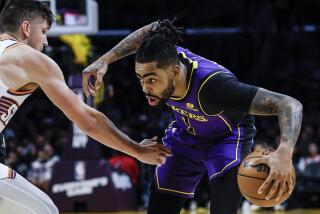POP MUSIC REVIEW : Russell, Once a Mad Dog, Loses His Bite
- Share via
SAN JUAN CAPISTRANO — Long ago, and oh so far away, Leon Russell was briefly a superstar, keeping company with Mad Dogs and Englishmen.
The eight-man band Russell brought to the Coach House Wednesday night was made up mostly of digitally equipped Nashville cats (native Oklahoman Russell is now a resident of Tennessee), not rootsy Englishmen. As for mad dogs, if Russell or anyone else in his crew of reserved professionals ever had any bark and bite, they are now so thoroughly housebroken that any Vegas casino showroom would feel secure in booking them without risk of having the rug stained with saliva, let alone sweat or spilled whiskey.
While devoid of glitz, there was a certain Vegas element to Russell’s 100-minute performance. It opened with a double fanfare: the first a pretty composition for synthesizers that presaged the domination of the digital (as in computers, not human fingers) that was in store. Then the band broke into an up-tempo, this-is-your-musical-life medley of some of Russell’s best-known melodies, as a prelude to the star’s appearance on stage.
When the 51-year-old singer-pianist arrived, taking labored steps with a cane, he looked like a cowboy Moses in ten-gallon hat and a pure-white abundance of mane and patriarchal beard.
When Russell first became famous, in the early ‘70s, it was as the main wheel responsible for the rolling and tumbling, deliciously Southern and natural-born sound of Joe Cocker’s “Mad Dogs and Englishmen” tour. That wide-open, spontaneously freewheeling approach of old was virtually absent from Russell’s Coach House performance. Whether playing songs from his ‘70s peak, or essaying nine of the 10 numbers from his less-than-exhilarating new major-label comeback album “Anything Can Happen,” Russell went for cluttered arrangements that emphasized tightly wound professionalism rather than allowing anybody, including himself, much room to ramble.
Russell played digital keyboards, with a minicomputer screen staring him in the face. The ring of players around him included three others also manning synthesizers that generated almost-organ, near-guitar, and approximate saxophone. Together, they relegated Russell to the role of just another cog in his own band. When Russell’s own keyboard work did hold sway, it came with an unsatisfying, robotic timbre, all pinging, plangent and inorganic.
These days, “Delta Lady” and other top-notch songs from Russell’s peak era wear a technocratic New South face. Played with the same machines used by every other slick R & B band on the circuit, they lost their distinctive regional flavor. Coming a night after Terry Adams of NRBQ made pianistic magic on the same stage with a good old clavinet and acoustic grand piano, Russell’s approach seemed especially unrewarding.
The band’s professionalism, and the strength of much of Russell’s material, kept things consistently passable. Only a bland run through “Tightrope” was truly perfunctory, and only “Black Halos,” a song rife with portent-laden Arabian cliches from the new album, really grew tiresome.
Russell played most of the best-known songs that fans in a receptive but less-than-rollicking house probably wanted to hear, although he left out two of his most famous compositions, “This Masquerade” (a hit for George Benson) and “Superstar” (a biggie for both the Carpenters and Luther Vandross).
Russell’s voice may be distinctive, but it is notable mainly for its creaky, thinly drawling quality. To wear well, it needed to be placed in more spacious and exciting musical surroundings.
Russell did get good, gospel-inspired backing vocal support from bassist Jack Wessel and one of the keyboard platoon members. And Mark Lambert’s guitar work, which offered a decent if too-rote approximation of Eric Clapton’s Stratocaster style, provided at least one element that didn’t sound as if it relied on a programmer’s skills as much as a player’s.
But the show had no fire, even when it gained momentum toward the end with a gospel-fueled medley of “Prince of Peace” and “Stranger in a Strange Land.”
Russell was no energy center, sitting motionless on his bench and saying nothing but polite, diffident-sounding thank-yous during a seamless set that moved along without pause.
For those on the right-hand side of the Coach House, Russell’s immobility made the concert a living approximation of the physiologically punning, rear-view cover of one of his old albums, “Hank Wilson’s Back.” You had to wait for his show-ending bows to see that the beard covering his chest was as long as the hair streaming past his shoulders.
Maybe Russell should take a cue from classical musicians in the period-instrument movement, who forsake modern equipment to play compositions with antiquated instruments in use when the music first was created. For Russell, the notion of better living through technology is a myth that tarnishes his own legacy.
More to Read
The biggest entertainment stories
Get our big stories about Hollywood, film, television, music, arts, culture and more right in your inbox as soon as they publish.
You may occasionally receive promotional content from the Los Angeles Times.











